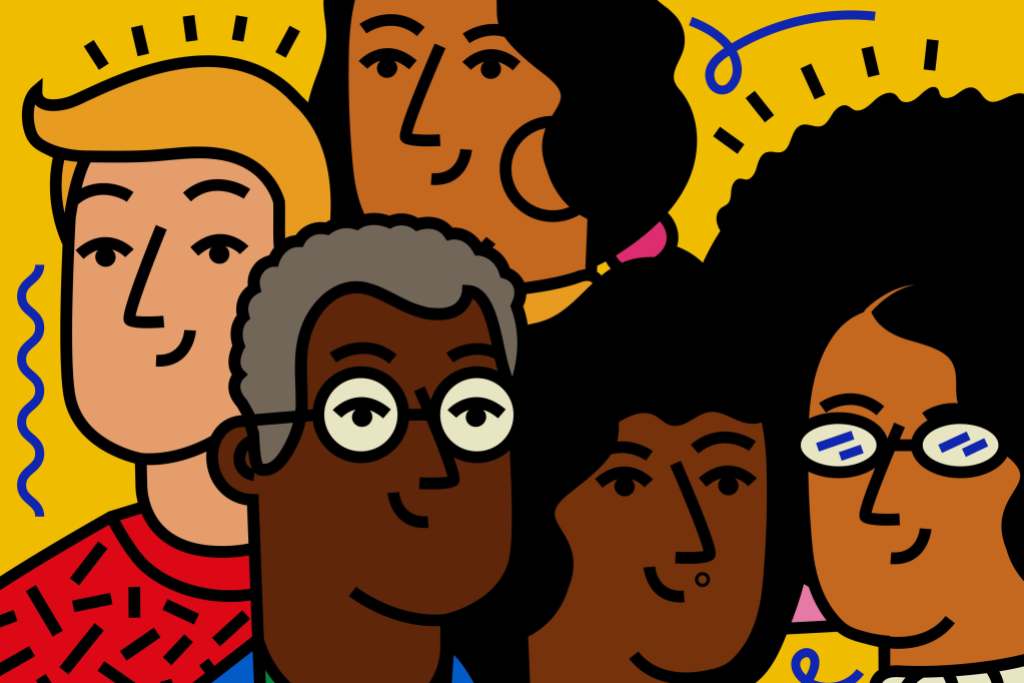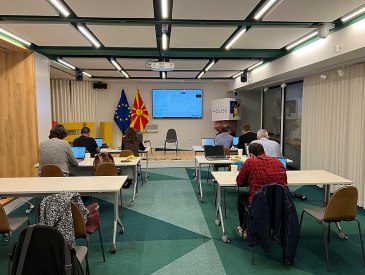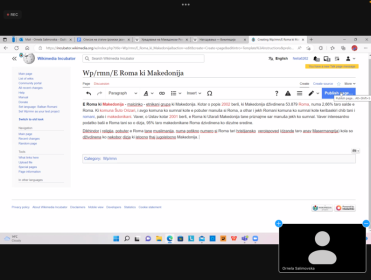
The implementation phase of the Capacity development for underrepresented communities (CDUC) project was conducted in the period from 1 September 2022 to 21 January 2023. It was based on the findings from the preceding research and consisted of activities directly aimed at engaging members of the targeted communities in contributing to the Wikimedia projects. A recently published report summarising the activities with each community provides more insights into this phase of the project.
Summary of the implementation phase

Aromanian speakers were introduced to the Wikimedia movement through workshops and an editing contest. A total of three workshops were held on a weekly recurrent basis in the period 8–22 November 2022 as hybrid events with both in-person and online attendance. Each workshop began with a brief introduction to the capacity development project, followed by a hands-on training on contributing to Wikipedia with a focus on the Aromanian edition and continued through most of the remaining time with an edit-a-thon in which participants were mentored by experienced editors. In order to address the concerns regarding the coverage of topics related to the Aromanian culture raised in the survey, a list of articles on Aromanian-related topics was compiled and shared with participants. A total of about 15 people were trained to contribute to Wikipedia either in-person or online, but all presentations from the events were recorded and subsequently shared with other Aromanian speakers.
The editing contest on the Aromanian Wikipedia run from 15 December 2022 to 13 January 2023 and its primary goal was to get the trained participants in the workshops involved in writing articles. There was no pre-determined theme and participants could write articles on any topic. A total of 5 editors actively participated in the contest, including participants who did not attend any of the workshops. They collectively created a total of 27 new and improved 33 existing articles. The majority of articles were written on Aromanian-related topics, with some of them being non-existent on any other Wikipedia. After the contributions in the contest were evaluated, the most prolific editors were awarded with symbolic prizes.

Similar activities were planned for the Romani speakers. A total of three workshops had to take place on a weekly recurrent basis in the period 10–24 November 2022 as hybrid events with a standardised structure consisting of a brief introduction to the capacity development project, a hands-on training on editing Wikipedia with a focus on the Balkan Romani Wikipedia in the Incubator and an edit-a-thon with mentorship by experienced editors. There was also a list of articles on Romani topics compiled to tackle the content gap. Despite the fact that there were registered participants for all three workshops, none showed up at the first and third event, whereas only one Romani speaker took part online in the second event. The only trained participant was a Romani-language teacher in a primary school, who successfully created a few articles on the Balkan Romani Wikipedia in the Incubator. She made some efforts to engage her pupils in the last workshop, but those attempts appeared to be unsuccessful.
The editing contest on the Balkan Romani Wikipedia in the Incubator run from 22 December 2022 to 21 January 2023 with a no pre-determined theme so that participants could write articles on any topic. However, no editors took part in the contest and none articles were written, so the planned prizes for the most prolific editors were not awarded.
A different implementation plan was made for the Macedonian Sign Language community, which included a couple of sessions for recording videos and a seminar. Considering that the majority of surveyed users of the Macedonian Sign Language indicated that they are not fluent in the Macedonian language and raised concerns regarding the limited use of the sign language, the primary goal of the recording sessions was to produce free high-quality videos documenting encyclopedic content abstracted from Wikipedia articles that were subsequently uploaded to Wikimedia Commons. The recording sessions took place in November 2022. The recording process was arranged in collaboration with a sign language interpreter who featured in the recordings. Another important detail is that a user of the Macedonian Sign Language was hired as a video producer in an attempt to guarantee the quality of the videos.
The seminar took place on 11 December 2022 in a school for deaf and hard of hearing people in Skopje. It was an eight-hour event consisting of hands-on trainings on editing Wikipedia and Wikimedia Commons, as well as a recording session in which participants featured as interpreters in the recordings. A total of about 25 users of the Macedonian Sign Language from different parts of Macedonia participated in the seminar and produced about 15 high-quality videos documenting encyclopedic topics from Wikipedia. They were guided by two language interpreters.
Future plans
Following the successful implementation of the planned activities with the Aromanian-speaking community, the future plans include further integration of the newly emerging community into Wikimedia Central and Eastern Europe. In that context, a potential follow-up could consist of participation in Wikimedia CEE Spring, joining the network of Wikimedia CEE Hub and sending delegates at the Wikimedia CEE Meeting.
Considering that the implementation of the planned activities with the Romani-speaking community were unsuccessful, which possibly accounts for the preference towards generating contents about their culture on other languages, the future plans include collaboration on organising events in which members of the community would write impartial and reliable articles to break the common stereotypes about the Romani people in the society.
As the collaboration with the Macedonian Sign Language community resulted in identifying a new form of free knowledge, an idea was born to conduct a project on producing videos documenting scientific terminology interpreted in the Macedonian Sign Language. Specifically, the project would focus on interpreting economic and legal terms that the members of this community encounter in everyday life but fail to clearly comprehend.

Can you help us translate this article?
In order for this article to reach as many people as possible we would like your help. Can you translate this article to get the message out?
Start translation